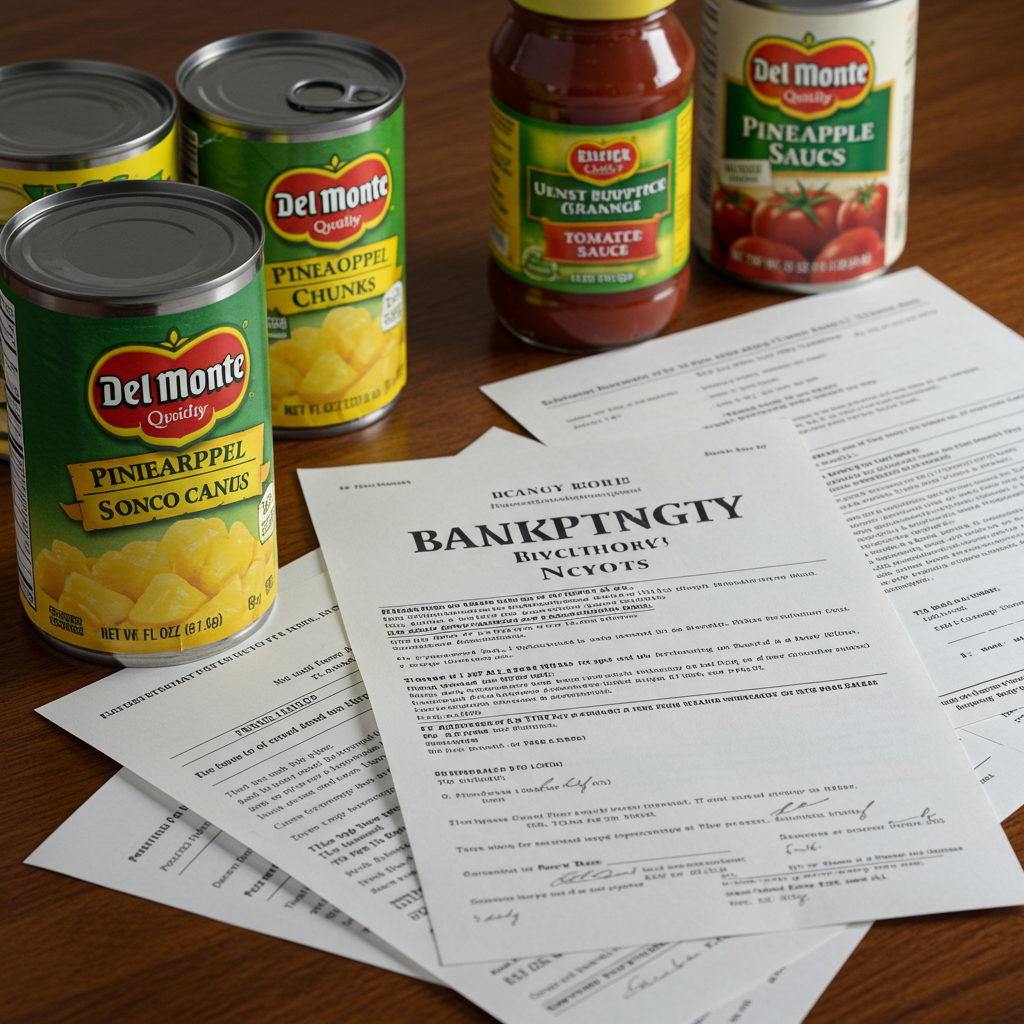The iconic name in canned goods, Del monte Foods, is navigating significant financial challenges. The nearly 140-year-old company recently announced its voluntary filing for chapter 11 bankruptcy protection. This strategic move, according to leadership, aims to facilitate a sale process and pave the way for a stronger future for the beloved food brand and its associated product lines.
A Century-Old Giant Faces Modern Headwinds
Founded in 1886 and headquartered in Walnut Creek, California, Del Monte Foods has long been a staple in American pantries. Known primarily for its wide selection of canned fruits and vegetables, the company also boasts a portfolio of other well-known brands, including Contadina tomato products, College Inn and Kitchen Basics broths, JOYBA bubble teas, Take Root Organics, and S&W.
The decision to file for bankruptcy on July 2, 2025, in the U.S. Bankruptcy Court for the District of New Jersey follows a period of mounting pressure. Del Monte Foods cited a confluence of factors contributing to its financial strain. Rising debt played a significant role, compounded by increasing borrowing costs in a dynamic macroeconomic environment.
Key Factors Behind Del Monte’s Filing
Broader economic trends have impacted the company’s performance. These included persistent grocery inflation, which pushed consumers to seek out more affordable alternatives, often leading them towards cheaper store-brand products over established names like Del Monte.
Perhaps the most impactful challenge has been a significant shift in consumer preferences. Modern shoppers are increasingly prioritizing fresh, organic, or less-processed options. This pivot away from traditional canned goods, often perceived as less healthy or laden with preservatives, directly eroded sales in Del Monte’s core product categories.
Adding to the economic pressures, the company faced increased operational costs. Notably, a 50 percent U.S. tariff imposed on imported steel in June was projected to substantially raise the cost of the very cans central to Del Monte’s packaging and business model.
Furthermore, a legal dispute stemming from a previous debt restructuring plan added financial burden. Although settled, the lawsuit resulted in an increase of $4 million annually in Del Monte’s interest expenses, further tightening its financial liquidity. Pandemic-related disruptions and missteps were also cited as contributing factors to the company’s difficulties.
A Strategic Step Towards Restructuring and Sale
Del Monte Foods leadership frames the bankruptcy filing not as an end, but as a necessary strategic step. Greg Longstreet, the company’s President and CEO, stated that after a thorough evaluation of all available options, a court-supervised sale process was determined to be the most effective path forward.
The goal is to accelerate a turnaround. By entering Chapter 11, Del Monte Foods aims to emerge with a fundamentally improved capital structure and enhanced financial position. The planned sale of “all or substantially all” of its assets under court supervision is intended to attract new ownership. This fresh start with a different financial foundation is seen as crucial for positioning the company for long-term success in a challenging market.
Navigating the Bankruptcy Process
To ensure continued operations throughout the Chapter 11 proceedings, Del Monte Foods has secured substantial debtor-in-possession financing. The company received a commitment of $912.5 million from existing lenders. This significant funding is intended to allow Del Monte to remain open and fully operational, maintaining its supply chain, relationships with growers, and production facilities.
The bankruptcy filing documents estimate Del Monte Foods’ assets and liabilities to fall within the range of $1 billion to $10 billion. The number of creditors is estimated to be between 10,000 and 25,000, reflecting the scale of the company’s operations and financial entanglements. It’s important to note that some of Del Monte Foods’ non-U.S. subsidiaries are not included in this Chapter 11 filing and are expected to continue operating as usual.
The Broader Context of Changing Consumer Tastes
The challenges faced by Del Monte Foods highlight a broader trend affecting the packaged food industry. Analysts like Sarah Foss, global head of legal and restructuring at Debtwire, have pointed out the accelerating shift away from traditional canned and processed foods. Consumers are increasingly educated about nutrition and ingredients. They are actively seeking out products with shorter ingredient lists, fewer preservatives, and perceived health benefits.
While Del Monte’s core canned goods business has seen significant decline, the company has experienced growth in other segments. Sales in its JOYBA bubble tea and broth lines, including College Inn and Kitchen Basics, showed positive momentum in fiscal year 2024. However, this growth was ultimately insufficient to offset the substantial drop in sales from its foundational canned fruit and vegetable products. The bankruptcy filing underscores the difficulty legacy brands face in adapting rapidly to seismic shifts in consumer behavior and preferences.
Del Monte’s current situation is also reflective of a trend seen across various sectors. Over the past year, several other prominent consumer-facing companies, including retailers and restaurant chains, have also sought Chapter 11 protection, indicating widespread economic and market pressures affecting established businesses.
Despite the challenges, CEO Greg Longstreet reaffirmed the company’s commitment to its long-standing mission. He emphasized Del Monte Foods’ nearly 140-year history of nourishing families and its ongoing dedication to expanding access to nutritious, great-tasting food for all. He also expressed gratitude to employees, growers, customers, vendors, and lenders for their continued support during this transitional phase. The company, owned by Singapore’s Del Monte Pacific, is now focused on executing the court-supervised sale process to secure its future under new ownership.
Frequently Asked Questions
Why did Del Monte Foods file for bankruptcy?
Del Monte Foods filed for Chapter 11 bankruptcy due to multiple factors including rising debt, increasing borrowing costs, changing consumer habits favoring healthier or cheaper alternatives, ongoing grocery inflation impacting sales, increased costs from steel tariffs affecting can prices, and financial burdens from a legal settlement. These issues were exacerbated by pandemic missteps and a challenging macroeconomic environment.
Where did Del Monte Foods file for Chapter 11?
Del Monte Foods initiated its voluntary Chapter 11 bankruptcy proceedings in the U.S. Bankruptcy Court for the District of New Jersey on July 1, 2025. This court will oversee the company’s restructuring and the proposed court-supervised sale process. The company is headquartered in Walnut Creek, California.
Will Del Monte Foods continue operating during bankruptcy?
Yes, Del Monte Foods explicitly states its intention to remain open and continue operating business as usual throughout the Chapter 11 bankruptcy process. The company has secured $912.5 million in debtor-in-possession financing from its lenders specifically to fund these ongoing operations during the restructuring and sale period.
In conclusion, Del Monte Foods’ bankruptcy filing marks a pivotal moment for the historic canned goods company. Driven by complex economic pressures and evolving consumer trends, the company is undertaking a court-supervised sale process. With significant financing secured, Del Monte aims to maintain operations while seeking new ownership and a path to renewed financial health and relevance in the competitive food market.


